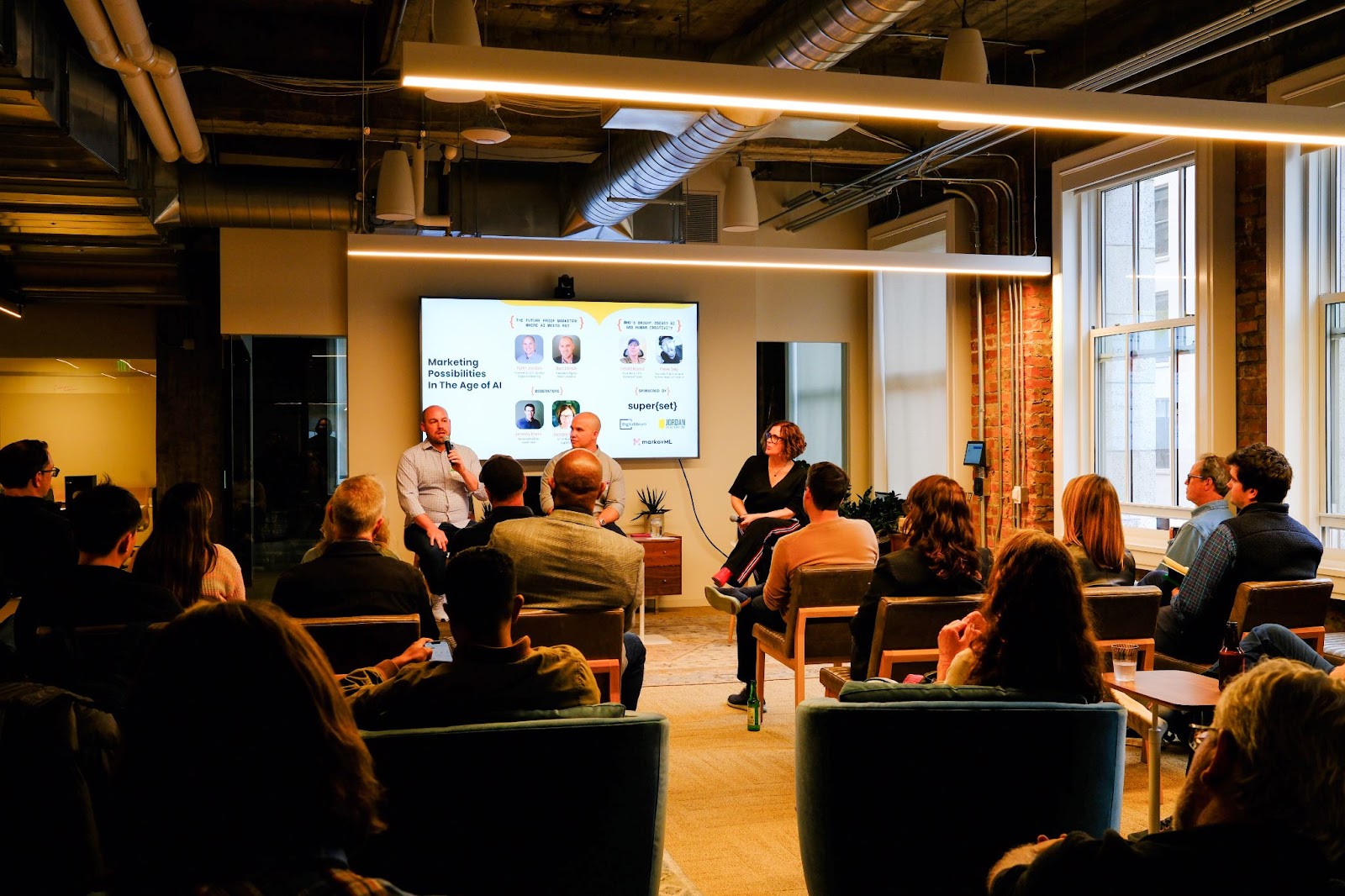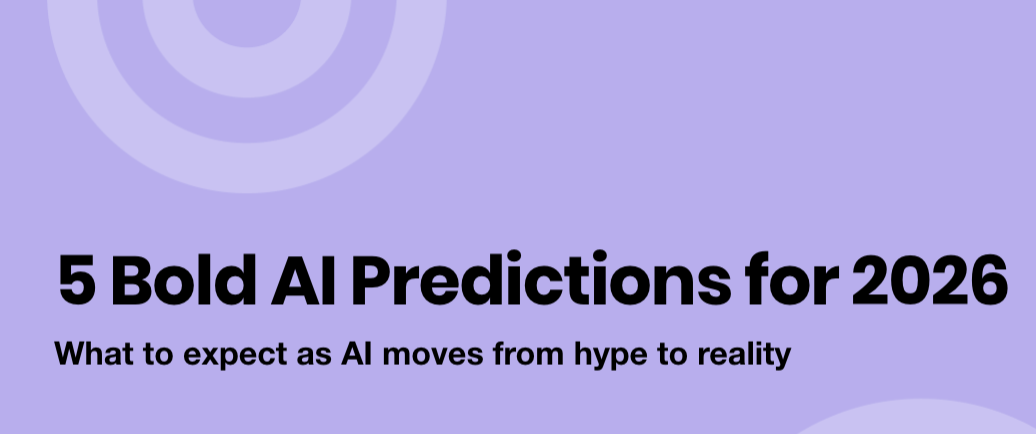
AI Adherent or Skeptic? Why Not Both?

Get a bunch of marketing folks in a room to talk about emerging trends in the industry and you’re going to hear a lot of strongly held opinions and even see an occasional elbow thrown. We did get a lot of that at our roundtable, Marketing Possibilities in the Age of AI, held mid May at super{set} HQ in San Francisco. It was a lively and engaging event that ran long because of all the questions attendees had—lots of back and forth, lots of laughs. But perhaps the most surprising thing that emerged? Consensus.
The night’s opening panel featured Ben Childs, president of Digital Reach Agency, and Tyler Jordan, founder of Jordan Digital Marketing, with super{set}’s marketing guru Deirdre Mahon moderating. Both Digital Reach and Jordan Digital have adopted AI tools in their business processes, with something of a counterintuitive bent. Where so much media coverage of AI focuses on generative AI’s capabilities to synthesize content and visuals, Jordan and Childs very much perceive AI’s most valuable aspect as its ability to deliver on better analysis, audience measurement, personalization and targeting in shaping outbound digital campaigns.

Event Details
Mahon: Individuals are using AI (LLMs) today but what are you seeing with the entire marketing team?
Jordan and Childs: Both emphasized that attempting to use AI as an automated tool for creative iteration sounds tempting, but it risks diluting or obscuring a company’s individual brand voice. Where AI’s primary value for marketers can really shine is with the grunt work of campaign analysis, teasing out new key performance indicators (KPIs) and targeting. Both marketers also emphasized that AI is only as good as the data it’s working with. While AI is becoming an important power-tool for personalized campaigns, smarter targeting and forecasting, bad data can and will lead to bad results. Even incomplete or inaccurate data compromises AI performance.
Rather than seek ways to leverage AI to automate or expedite the development of creative assets, use it to optimize the planning and operational aspects of your campaigns. So much of today’s digital marketing is built on data housed in “legacy” applications such as HubSpot, Salesforce and other CRM-type platforms—that are likely to remain key resources for years to come, despite what advancements we see with AI. And because data is the lifeblood of digital marketing, a wise investment to get the most out of AI would be to invest in tools that can combine and clean up data from different sources. Likewise, you’ll want to establish clear data entry and management processes to ensure accuracy, and regularly review and update customer data for potential errors, duplicates and omissions.
Mahon: How can marketers introduce new, modern AI-first tech tools when they already have tool bloat? Also, how can they adopt AI-first tech and get buy-in from budget holders–is this something that is on a case-by-case basis?
Another point of enthusiastic agreement from Jordan and Childs is that marketers shouldn’t be afraid of testing out new AI tools and signing up for month-to-month accounts that will enable teams to thoroughly test them out. At the same time, marketers should NOT jump into annual or long-term contracts on what are still essentially unproven technologies. “Don’t blow your budget” was a refrain that came up repeatedly through the evening. On the same tack: do pay attention to thoughts and impressions shared on the more active forums for digital marketers where AI is a main topic of discussion. Boards that came up as valuable sources of news and opinion included Warrior Forum, Reddit’s Marketing Forum and the AI Marketing Forum.
The Importance of Hands-On Experience and Knowing the Limits of AI
The second panel of the night featured David Baeza, founder and CEO of Santa Barbara’s Buttered Toast agency, and Peter Day, former chief product and technology officer (CPTO) at Quantcast (and one of the few people in the world with a PhD in machine learning). This panel, moderated by super{set} general partner Jeremy Klein echoed some of the same themes that emerged in the Jordan & Childs session, but with a bit more emphasis on hands-on learning, and some of the more far-out capabilities of AI.
Klein: What are the risks of over-reliance on AI when storytelling and engaging customers? How can teams stand out from the noise and how can they stay original and relevant with easy-to-use LLMs for content?
Peter Day made a passionate (and convincing) argument that brand voice is one of the most essential assets for any organization, and that turning over that voice to an AI would be a mistake. He pointed out that LLMs work on a model where, when prompted to provide a description of what kind of business Company X is involved in, for instance, those LLMs will scan the websites and content of organizations involved in the same line of business and return a description that reflects the wording and language structures used by those other companies.

Put another way, AI content tools tend to find a neutral middle ground using generic terminologies where brand voice isn’t really a consideration at all. Day posited that the most effective brand voices are sharp, assertive, personable and engaging. And he questioned why anyone would want to hand over their content marketing and brand communication to tools that purposefully default to broadly descriptive language, often generic.
Klein: How do teams control the narrative and what parts are best handled by the human brain?
Baeza had what may have been the most straightforward and easily actionable advice of the night: marketers need to take the time to do a deep dive into whatever AI tool you plan to use in your organization. He recounted spending a weekend working with LLMs including ChatGPT, Claude, Copilot, Gemini and solutions like MarkovML to gain an understanding of what these tools could accomplish specifically in terms of the individual functions of a marketing agency: strategy, planning, design, content, SEO, project management, media and more.
Seems simple, but Baeza’s insights closely aligned with what Jordan & Childs brought up earlier in the night—that AI shows the most promise in automating the data-intensive aspects of digital marketing. As for the creative side? Baeza pointed out that Buttered Toast’s head of content has advanced degrees in literature and writing. Why would his agency advise clients to go with cookie-cutter copy when they have a highly skilled and accomplished writer on staff?
Consensus: The Human Element Remains Essential
If there was one takeaway from the evening, it would be that when it comes to AI and how it can benefit marketers, the prevailing sentiment is: show me, prove it. All four panelists are enthusiastic about how AI can improve the effectiveness of the services they offer by augmenting their capabilities in innovative ways. Yet a healthy skepticism was clearly evident as well, which one would expect from experienced digital professionals who have lived through several sea changes in their careers as advancements in mobile, social, search, data analysis and now AI have all upended the marketing playing field. Embrace the new thing, but make sure it’s delivering value and your bottom line.
Author:
- Deirdre Mahon, VP Marketing, super{set}
Tech, startups & the big picture
Subscribe for sharp takes on innovation, markets, and the forces shaping our future.
Let's keep in touch
We're heads down building & growing. Learn what's new and our latest updates.


